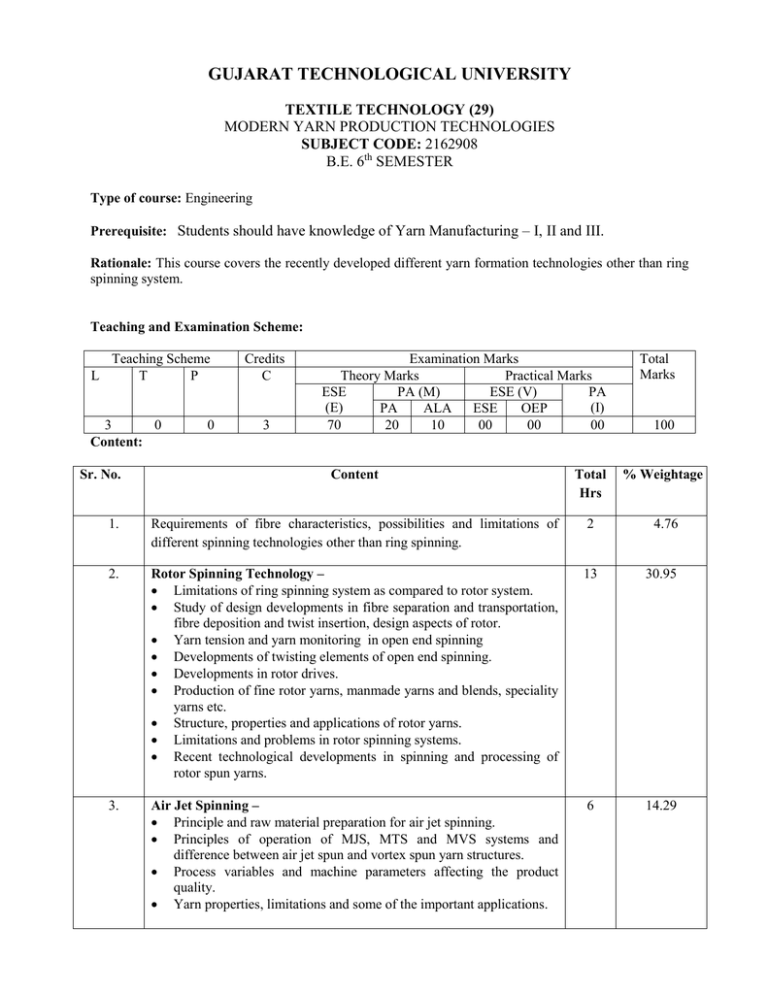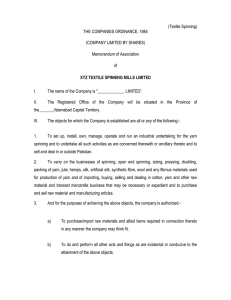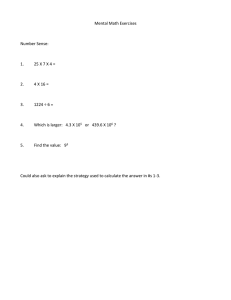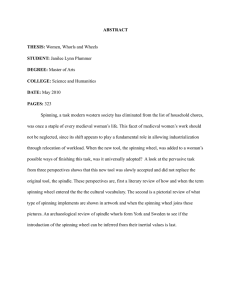2162908 - Gujarat Technological University
advertisement

GUJARAT TECHNOLOGICAL UNIVERSITY TEXTILE TECHNOLOGY (29) MODERN YARN PRODUCTION TECHNOLOGIES SUBJECT CODE: 2162908 B.E. 6th SEMESTER Type of course: Engineering Prerequisite: Students should have knowledge of Yarn Manufacturing – I, II and III. Rationale: This course covers the recently developed different yarn formation technologies other than ring spinning system. Teaching and Examination Scheme: L Teaching Scheme T P 3 0 Content: Sr. No. 0 Credits C 3 Examination Marks Theory Marks Practical Marks ESE PA (M) ESE (V) PA (E) (I) PA ALA ESE OEP 70 20 10 00 00 00 Total Marks 100 Content Total Hrs % Weightage 1. Requirements of fibre characteristics, possibilities and limitations of different spinning technologies other than ring spinning. 2 4.76 2. Rotor Spinning Technology – Limitations of ring spinning system as compared to rotor system. Study of design developments in fibre separation and transportation, fibre deposition and twist insertion, design aspects of rotor. Yarn tension and yarn monitoring in open end spinning Developments of twisting elements of open end spinning. Developments in rotor drives. Production of fine rotor yarns, manmade yarns and blends, speciality yarns etc. Structure, properties and applications of rotor yarns. Limitations and problems in rotor spinning systems. Recent technological developments in spinning and processing of rotor spun yarns. 13 30.95 3. Air Jet Spinning – Principle and raw material preparation for air jet spinning. Principles of operation of MJS, MTS and MVS systems and difference between air jet spun and vortex spun yarn structures. Process variables and machine parameters affecting the product quality. Yarn properties, limitations and some of the important applications. 6 14.29 4. Friction Spinning – Principle of operation and requirements of raw material. Stages involved in the production of yarns in friction spinning. Working principle of different friction spinning systems like DREF1, DREF2, DREF3, DREF5, DREF2000, DREF3000 alongwith technical descriptions. Process variables and machine parameters affecting the product quality. Yarn properties, limitations and some of the important applications. 5. Other Unconventional Spinning Techniques – Introduction to wrap spinning, cover spinning, Bobtex Spinning, SIRO spinning, Self- twist spinning, Twistless spinning, Electrostatic spinning, Core spinning, solo spun yarn manufacture etc. Requirements of raw materials, principles of operation and properties of yarns produced from these spinning systems. Some of the important advantages and limitations of these spinning systems. 8 19.05 6. Compact Spinning – Principles of operation and raw material preparation. Comparison of yarn structure with that of ring spun yarn. Detailed study of compact yarns like ROCOS, Elite, COMFOR spinning etc. 3 7.14 7. Recent developments in all these spinning systems . 4 9.52 6 14.29 Suggested Specification table with Marks (Theory): Distribution of Theory Marks R Level 15 U Level 20 A Level 20 N Level 5 E Level 5 C Level 5 Legends: R: Remembrance; U: Understanding; A: Application, N: Analyze and E: Evaluate C: Create and above Levels (Revised Bloom’s Taxonomy) Note: This specification table shall be treated as a general guideline for students and teachers. The actual distribution of marks in the question paper may vary slightly from above table. Reference Books: 1. 2. 3. 4. 5. 6. 7. Spinning in ‘70s, P. Lord. Rotor Spinning, Dyson. Open-end spinning, R. Nield. Rotor Spinning, Lawrence. Textile Yarns, Goswami & Martindale. Manmade Fibre Production, G. R. Wray. Modern Spinning Systems, W. Klein Vol.- V. 8. Rotor Spinning : Its advantages, limitations and prospects in India, 1st Ed; Salhotra K R and Ishtiaque S M, National Information Centre for Textile and Allied Subjects,1995. 9. Manual of Textile Technology: New Spinning Systems, 1st Ed; Klein W, The Textile Institute, Manchester, UK 1993. 10. Fundamentals of Spun Yarn Technology, 1st Ed; Lawrence C A, CRC Press LLC, Florida,USA (2003) 11. Advances in Yarn Manufacturing Process, Chattopadhyay R and Ishtiaque S M, Department of Textile Technology, IIT Delhi 1991. 12. Trade Literature of Trutzschler, Rieter, Marzoli, cheery Hara, Toyoda, Holligsworth etc. 13. Textile Progress Vol.3, No.2 – A Critical Appreciation of Recent Developments – Yarn Production and Properties by W. Nuttler. 14. The Economics of Science and Technology of yarn production – Vol.-I and II 15. Textile progress vol. 10 No.2 – The Production and properties of staple fibre, Yarns made by Recently developed Techniques by L. Hunter. 16. Air jet spinning – Textile Progress, Textile Institute Publication. 17. Hand Book of Yarn Production by P. R. Lord 18. Spun Yarn Technology by Carl A. Lawrence 19. Vol V New Spinning Systems – H. Staldar 20. Textile Progress on open end spinning – C. A. Lawarance 21. Spun Yarn Technology by Eric Oxtoby. Course Outcome: After learning the course the students should be able to: 1. 2. 3. 4. Calculate the draft to be required to produce the yarn at the rotor / other spinning machines. Produce different types of yarns as per the requirements. Set and produce different types of fancy yarns. Describe the remedial measures to be taken for different quality related problems occurred at the time of production of different types of yarns. 5. Calculate the production and efficiency of all the machines. List of Open Source Software/learning website: http://nptel.iitm.ac.in, World Wide Web, Google Search Engine etc. ACTIVE LEARNING ASSIGNMENTS: Preparation of power-point slides, which include videos, animations, pictures, graphics for better understanding theory and practical work – The faculty will allocate chapters/ parts of chapters to groups of students so that the entire syllabus to be covered. The power-point slides should be put up on the web-site of the College/ Institute, along with the names of the students of the group, the name of the faculty, Department and College on the first slide. The best three works should submit to GTU.



